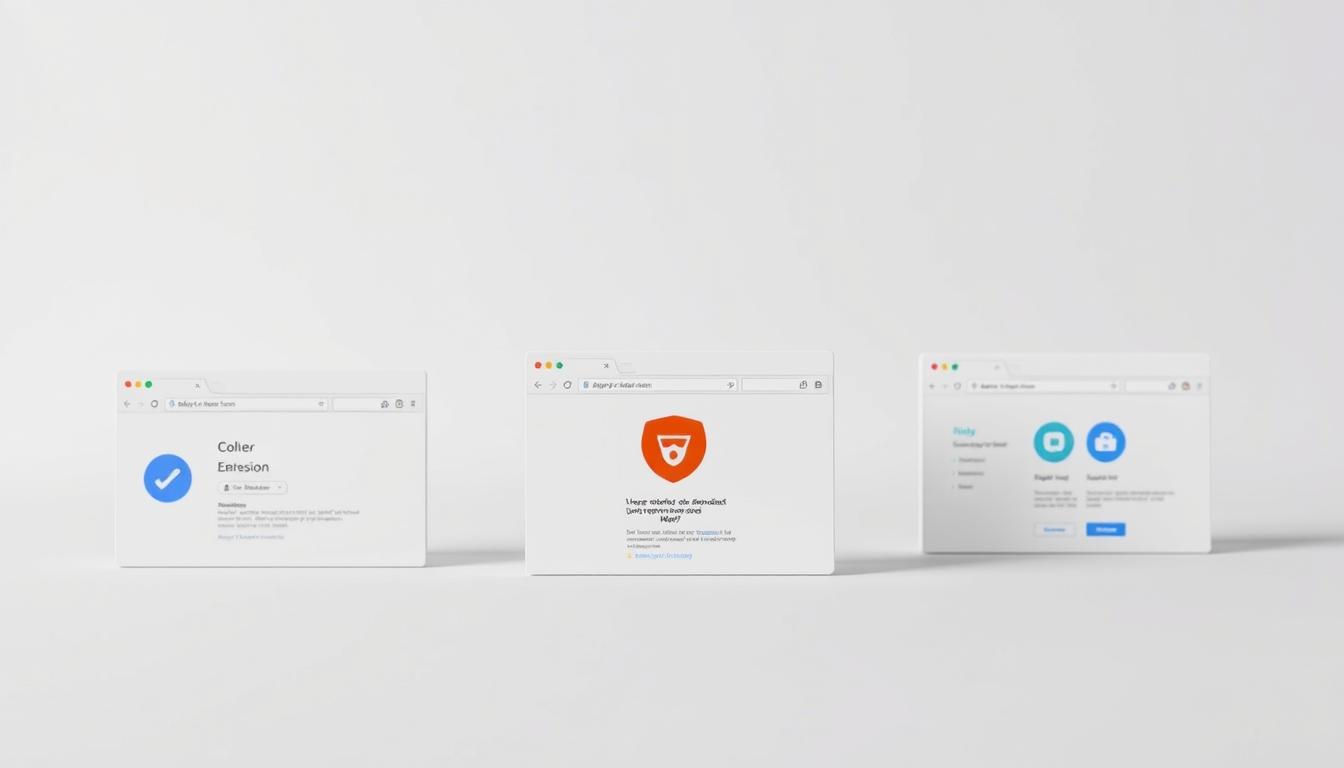In today’s digital world, keeping your online presence safe is key. With more cyber threats around, the right browser extensions can make your safe browsing much better.
As we move into 2025, the need for privacy tools grows stronger. This guide will show you the latest on online privacy. You’ll also learn about top browser extensions that protect your digital self.
By the end of this guide, you’ll know how to pick the best tools for a safe online journey. Stay one step ahead of cyber threats and keep your online privacy safe with the right browser extensions.
Key Takeaways
- Discover the most effective browser extensions for online security.
- Learn how to protect your digital identity with privacy tools.
- Understand the importance of safe browsing in 2025.
- Find out how to stay ahead of emerging cyber threats.
- Explore a curated list of must-have browser extensions for a secure online experience.
The State of Online Privacy in2025
Online privacy is a big worry in 2025, with new dangers popping up every day. It’s key to know the current state of online privacy and how to keep it safe.
Current Threats to Your Online Privacy
The internet is full of dangers to your privacy. From sneaky data collection to new cyber threats, it’s a tough place to stay safe. Data collection practices have gotten smarter, with websites and ads tracking you everywhere.
Data Collection Practices
Data collection is now a big business. Companies use complex algorithms to get and use your data. This data is often for ads, but it can also be stolen, putting your identity at risk.
Emerging Cybersecurity Risks
As tech gets better, so do the dangers. Cybersecurity threats are getting smarter, with hackers finding new ways to get into systems and steal your info.
Why Browser Extensions Are Essential for Protection
Browser extensions are vital for keeping your online privacy safe. They block trackers, ads, and bad scripts, making your browsing safer. By picking the right extensions, you can greatly improve your online security.
“Using browser extensions is a simple yet powerful way to protect your online privacy,” says a cybersecurity pro. This shows how important it is to choose the right tools for your safety.
Understanding Browser Extensions for Safe Browsing
As we explore the web, knowing about browser extensions is key. These small programs add a lot to your browser’s security and features.
How Privacy Extensions Work
Privacy extensions help keep your online life private. They block trackers and ads. This stops bad scripts and keeps your data safe from third parties.
Key Functionality: These extensions block ads, trackers, and encrypt your data. This reduces the chance of your info getting stolen or lost.
Different Types of Security Extensions
There are many security extensions out there. They cover different needs, like blocking ads, trackers, managing passwords, and using VPNs.
- Ad blockers make websites load faster and look cleaner.
- Tracker blockers keep your online activities private.
- Password managers help you keep strong, unique passwords for all sites.
Evaluating Extension Permissions
When you add extensions, check their permissions closely. Some might ask for too much, which could be a privacy risk if they’re not safe.
Red Flags to Watch For
Be wary of extensions that ask for too much or seem fishy. Always check the permissions before you install.
Necessary vs. Suspicious Permissions
It’s important to know the difference between good and bad permissions. Good permissions let the extension work right. Bad permissions might mean trouble.
| Permission Type | Description | Example |
|---|---|---|
| Necessary | Permissions needed for the extension to work as it should. | Access to browsing history for a password manager. |
| Suspicious | Permissions that aren’t needed for the extension to work. | Access to all browsing data for an ad blocker. |
As shown in the table, knowing what permissions extensions need is key. Being smart about what you allow can really boost your online safety.

In today’s digital world, browser extensions play a big role in keeping us safe online. By understanding how they work and what permissions to grant, we can better protect our digital selves.
How to Install and Manage Browser Extensions
To keep your browsing safe, it’s important to know how to install and manage browser extensions. These extensions can boost your online security. But, you need to install and manage them carefully to avoid risks.
Finding Official Extension Stores
When you want to install browser extensions, find official stores. For Chrome, use the Chrome Web Store. For Firefox, go to the Mozilla Add-ons site. Official stores help you avoid installing harmful software.
Installation Process Across Different Browsers
The way you install extensions varies by browser. Most browsers let you install extensions from their stores. For example, in Chrome, click “Add to Chrome” on the Chrome Web Store. In Firefox, click “Add to Firefox” on Mozilla Add-ons.
Managing and Updating Your Extensions
After installing, managing your extensions is key. Most browsers have a menu or page for this. Here, you can update, remove, or adjust permissions for extensions.
Checking your extensions regularly keeps them effective and secure. This makes your browsing safer.
Essential Ad Blockers and Tracker Blockers
To keep your online privacy safe, you need the right tools. Ad blockers and tracker blockers are key. They make your browsing better by cutting down on clutter and keep your data safe from trackers.
Top Ad Blocking Extensions
Ad blockers are vital for a cleaner and safer web. Here are some top ad blocking extensions:
uBlock Origin
uBlock Origin is a top pick for ad blocking. It blocks ads, trackers, and malware without slowing down your browser.
AdGuard
AdGuard is another favorite ad blocker. It blocks ads and also protects against trackers and phishing, boosting your online safety.
Tracker Blocking Tools Worth Installing
Tracker blockers are key for keeping your privacy online. They stop advertisers and others from tracking your web activities.
Privacy Badger
Privacy Badger is a tracker blocker from the Electronic Frontier Foundation (EFF). It blocks trackers automatically, keeping your browsing data private.
Ghostery
Ghostery is a well-known tracker blocker. It gives you detailed info on the trackers it blocks, helping you control your online privacy.
| Tool | Primary Function | Key Features |
|---|---|---|
| uBlock Origin | Ad Blocking | Efficient ad blocking, minimal performance impact |
| AdGuard | Ad Blocking & Anti-Tracking | Blocks ads, trackers, and phishing attempts |
| Privacy Badger | Tracker Blocking | Automatically blocks trackers |
| Ghostery | Tracker Blocking | Provides insights into blocked trackers |

Password Management Extensions
Online security is getting more complex, and password management extensions are key. They help users create and keep unique, complex passwords for all their online accounts. This greatly boosts their online security.
Benefits of Password Managers
Password managers have many benefits. They create strong, unique passwords and keep them safe. They also make logging in easier by filling in your info for you, helping you manage many accounts.
Key advantages include better protection against phishing and password cracking. They also help avoid password fatigue and allow secure password sharing when needed.
Top Password Manager Extensions for 2025
In 2025, some password manager extensions will stand out. Let’s explore some of the best ones.
Bitwarden
Bitwarden is a top choice, known for its open-source nature and strong encryption. It’s available for many browsers, making it a great option.
1Password
1Password is famous for its top-notch security and easy-to-use design. Its browser extension works well with its apps for desktop and mobile.
LastPass
LastPass provides a full range of password management tools. It includes password creation, secure storage, and alerts for weak or duplicate passwords. It works with many browsers.
Using these password management extensions can greatly enhance your online security. It also makes your online life easier.
VPN Extensions for Enhanced Privacy
Installing a VPN extension is a smart move for safer browsing. These extensions encrypt your internet traffic. This makes it hard for hackers and trackers to get your data.
How VPN Extensions Protect Your Browsing
VPN extensions send your internet traffic through a secure server. They hide your IP address and encrypt your data. This keeps your browsing private, even on public Wi-Fi. Using a VPN extension greatly lowers the risk of data breaches and cyber attacks.
Best VPN Extensions of 2025
Here are some top VPN extensions for 2025:
- ExpressVPN: Known for its high-speed servers and robust security features.
- NordVPN: Offers advanced security features, including double encryption and a strict no-logs policy.
ExpressVPN
ExpressVPN is a favorite among VPN users. It has fast connection speeds and reliable service. It’s easy to use and works well with many browsers.
NordVPN
NordVPN is known for its top-notch security. It has double encryption and a big server network. It’s perfect for those who want the best privacy protection.
Limitations of Browser-Based VPNs
VPN extensions have their downsides. They might not cover non-browser apps, and they can slow down your browsing. Knowing these limits helps you use VPN extensions wisely as part of your safe browsing plan.
Extensions for Safe Browsing (Updated2025)
Cyber threats are growing, making it key to find the best browser extensions for safe browsing. These tools are vital in protecting us from online dangers.

Anti-Phishing Extensions
Anti-phishing extensions help fight phishing attacks, which are getting smarter. Here are two top picks:
Web of Trust
Web of Trust gives websites reputation ratings. This helps spot sites that might be harmful.
Netcraft Extension
The Netcraft Extension blocks phishing attempts. It makes sure your browsing is safer.
Malware Detection Tools
Malware detection is key for safe browsing. Here are some top tools:
Malwarebytes Browser Guard
Malwarebytes Browser Guard stops malware and threats. It adds extra security while you browse.
Safe Browsing Indicators
Safe browsing indicators show if a site is secure. One great tool is:
HTTPS Everywhere
HTTPS Everywhere makes sure your connection to sites is secure. This boosts your browsing safety.
Using these extensions can greatly improve your online safety. It’s important to keep up with new extensions and safe browsing tips to avoid threats.
Privacy-Focused Browser Extensions
Privacy-focused browser extensions are key in today’s digital world. They keep your online identity hidden and guard your data from harm.
Cookie Management Tools
Managing cookies is vital for your online safety. Tools like Cookie AutoDelete and I Don’t Care About Cookies make it easier.
Cookie AutoDelete
Cookie AutoDelete gets rid of cookies when you’re done with them. This stops trackers from following you.
I Don’t Care About Cookies
I Don’t Care About Cookies makes dealing with cookie pop-ups a breeze. It lets you browse without interruptions.
Digital Fingerprinting Protection
Digital fingerprinting is a big privacy risk. Canvas Blocker is here to help.
Canvas Blocker
Canvas Blocker stops websites from making a digital fingerprint. It blocks or changes canvas data to keep you safe.
Email Privacy Tools
Keeping your email private is important. SimpleLogin is an extension that does just that.
SimpleLogin
SimpleLogin lets you create email aliases. This way, your real email stays hidden from spammers and trackers.
| Extension | Purpose | Key Feature |
|---|---|---|
| Cookie AutoDelete | Cookie Management | Automatic Cookie Deletion |
| Canvas Blocker | Digital Fingerprinting Protection | Blocks Canvas Data |
| SimpleLogin | Email Privacy | Email Aliasing |

Browser-Specific Security Extensions
Different browsers offer unique security extensions to protect users online. Some extensions work across many browsers, while others are made for specific ones. They use special features to boost security.
Chrome Security Extensions
Google Chrome has a wide range of security extensions. Some top picks include:
- uBlock Origin: Blocks ads, trackers, and malware effectively.
- HTTPS Everywhere: Makes sure your web connections are encrypted.
Firefox Privacy Tools
Mozilla Firefox is famous for its privacy features. Its security extensions stand out too. Key ones are:
- Privacy Badger: Blocks trackers and ads to protect your privacy.
- NoScript: Blocks JavaScript and harmful scripts.

Safari Security Extensions
Safari users have a few security extensions to choose from. Though fewer than Chrome or Firefox, they’re useful. Some notable ones are:
- 1Blocker: Blocks ads and trackers, speeding up your browsing and protecting your privacy.
- AdBlock for Safari: A strong ad blocker for Safari users.
Edge Privacy Extensions
Microsoft Edge, based on Chromium, offers many extensions similar to Chrome. It also has unique ones. Key security extensions for Edge include:
- Microsoft Editor: A writing tool that also provides security insights.
- AdBlocker Ultimate: Blocks ads, malware, and trackers effectively.
| Browser | Popular Security Extensions | Key Features |
|---|---|---|
| Chrome | uBlock Origin, HTTPS Everywhere | Ad blocking, encryption |
| Firefox | Privacy Badger, NoScript | Tracker blocking, script blocking |
| Safari | 1Blocker, AdBlock for Safari | Ad blocking, tracker blocking |
| Edge | Microsoft Editor, AdBlocker Ultimate | Writing assistance, ad blocking, malware protection |
How to Properly Configure Your Privacy Extensions
Setting up your privacy extensions right is key for safe online browsing. With so many choices, it might feel overwhelming. But, it’s vital for getting the most out of these tools.
Finding the Right Balance Between Security and Usability
Finding the right balance is a big challenge. You want to keep your online activities safe but also make sure the extensions don’t slow you down. Adjusting settings to block unnecessary trackers while letting important sites work is essential.
Recommended Settings for Maximum Protection
For top-notch protection, try these settings:
- Enable strict tracking protection
- Block third-party cookies
- Activate anti-phishing features
These steps can boost your online safety a lot. But, remember, too strict settings might make some sites hard to use.
Testing Your Privacy Setup
After setting up your privacy tools, it’s important to test them. Use
Privacy Testing Tools
like those fromPrivacyTools.ioorBrowserLeaks.comto check your browser’s privacy. These tools can spot weak spots and help you tweak your settings.
| Tool | Purpose |
|---|---|
| PrivacyTools.io | Assess browser privacy |
| BrowserLeaks.com | Detect browser fingerprinting |
As
“The best way to protect your online privacy is to be proactive and informed.”
Setting up your privacy tools is just the start. Keeping your settings up to date is just as important.
Conclusion
In 2025, browser extensions are key to keeping our online lives safe. They help us stay private and secure while we browse. Using the right privacy tools and browser extensions makes our online experience much better.
There are many extensions out there, each serving a different purpose. You can find everything from ad blockers to VPNs. These tools work together to make the internet a safer place for everyone.
It’s important to know how to set up these extensions properly. This way, you can enjoy a safe and easy browsing experience. It’s all about finding the right balance between security and convenience.
By making these privacy tools and browser extensions a part of our daily routine, we can keep our online identity safe. This is a vital step in protecting ourselves in the digital world we live in today.

